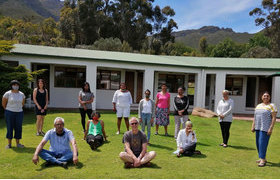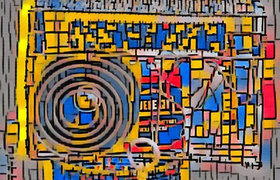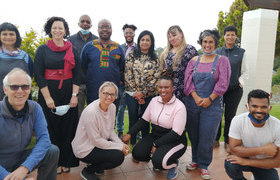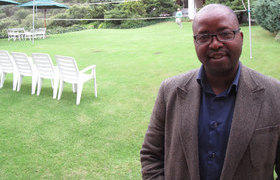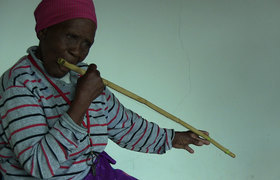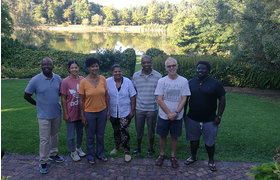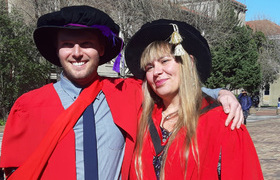Fossil footprints show how life endured amid volcanic eruptions
31 March 2020 | Story Robert Morrell. Photo PLoS ONE. Read time 6 min.
Emese Bordy and her collaborators published their research in PLoS ONE January in 2020. It immediately attracted global attention as it showed that dinosaurs in the Karoo had been alive at a time of a massive volcanic activity, surviving longer than many had thought possible.
Their article appeared as: Bordy EM, Rampersadh A, Abrahams M, Lockley MG, Head HV (2020) Tracking the Pliensbachian–Toarcian Karoo firewalkers: Trackways of quadruped and biped dinosaurs and mammaliaforms. PLoS ONE 15(1): e0226847.
It was quickly picked up by The New York Times, which covered the research in an article entitled: “When Dinosaurs Left Tracks in a Land Consumed by Lava and Fire”. This was followed by the coverage in The Conversation and numerous interviews for international and local media outlets.
The Conversation piece went viral with 6 000 reads in only three and a half days. The research and its behind-the-scene aspects also received extended coverage in The Mail & Guardian.
Here we reprint the full text of the article from The Conversation.
Fossil footprints provide a special source of scientific evidence. They reveal how animals walked and how large they were. In some cases where there are no body fossils like bones, trace fossils such as footprints or trackways may be the only evidence that animals were present in an ancient environment.
In our new publication, using techniques that have been honed by ichnologists – those who study trace fossils – we examined the trackways of land-dwelling vertebrates in what is today a farm in the centre of South Africa. These fossil trackways are preserved in sandstones within a thick pile of basaltic lava flows. They offer rare insights about ancient life in a stressful, hostile environment some 183 million years ago in the Early Jurassic.
These fossil trackways are preserved in sandstones within a thick pile of basaltic lava flows.
This geological epoch is probably best known in the public imagination as the dawn of the age of the dinosaurs. Towards the end of the Early Jurassic, a major geological event devastated life, especially in the oceans.
This mass extinction event was caused by, among other things, the degassing of the extensive lava flows that poured out during volcanic eruptions in the southern part of the supercontinent Gondwana. These volcanic eruptions changed the chemistry of the ancient atmosphere and oceans at the time.
But in between the voluminous volcanic eruptions, the environment and life in it occasionally recovered. It was during these intermittent periods that the movement of animals across the land surface could be captured as the fossil trackways we study today.
These ancient footprints are important because they tell us about the type of Early Jurassic animal life, and because the tracks bring together different earth science disciplines that can help us visualise what the ancient world looked like.
Reconstructing a landscape
There was more to our research than just reconstructing what individual animal species were and how they moved. We also had to reconstruct the ancient environment in which these animals lived. For this we had to incorporate existing findings from different academic disciplines.
These Early Jurassic trackways show that some animal life was resilient even as the environment changed and was hit by catastrophic events.
Geologists, including stratigraphers, volcanologists, geochronologists and sedimentologists, as well as palaeontologists, palaeobotanists and others, were all involved in studying these rocks before us. They gathered evidence about the properties of the sedimentary rocks that host the tracks; the plant fossils associated with these rocks; and the age, composition and structure of the ancient lava flows that entombed the track-bearing sediment surface.
Drawing from this existing research and our own work, our collective observations show that when vast sheets of lava flowed across the landscape, the environment turned into a land of fire. But during the quieter periods life returned to normal: streams ran, the sun shone, plants grew and the animals, among them dinosaurs, grazed and hunted.
What emerges is a picture not just of devastation wrought by volcanic eruptions, but one of a functioning ecosystem that endured despite environmental threats.
A new ichnospecies
Our research also unearthed a new species of dinosaur footprint. The best-preserved trackways at the Highlands farm site were made by dinosaurs – both meat-eating ones which walked on two legs, as well as plant-eating ones which walked on four legs. Less well-preserved trackways are more difficult to interpret. But those we studied appear to have been potentially made by synapsids, a group of reptiles that are considered to be the ancestors of mammals. The synapsids have a rich skeletal record in South Africa.
To identify the trackmakers, we carefully compared the morphology of the tracks – for example the shape, size and angles between the toe impressions – to other known tracks around the world. Some had characteristics common in footprints made by theropods, a group of carnivorous dinosaurs. But some showed features known only in tracks of ornithischians, a group of herbivorous dinosaurs.
We then closely compared our observations to those previously reported, and were able to come up with a list of diagnostic features that define the new ichnospecies. We named it after a French priest and trace fossil expert, Dr Paul Ellenberger, who is considered the father of vertebrate ichnology in southern Africa.
Significance of the South African fossil heritage
South Africa is a global epicentre for palaeontology. Discoveries made in the country have showcased some of the first animals to walk on land, some of the first mammals, the first turtles, early dinosaurs, and hominids.
But the country’s famous fossils only truly help us understand the history of life on Earth if their geological and palaeoenvironmental contexts are also described. Placed in their ancient environmental setting, these Early Jurassic trackways show that some animal life was resilient even as the environment changed and was hit by catastrophic events.![]()
Emese M Bordy, Associate Professor in Geological Sciences, University of Cape Town.
 This work is licensed under a Creative Commons Attribution-NoDerivatives 4.0 International License.
This work is licensed under a Creative Commons Attribution-NoDerivatives 4.0 International License.
Please view the republishing articles page for more information.
Next Generation Professoriate (NGP)
The Next Generation Professoriate (NGP) is a mid-career academic staff development and support programme. Funded by the vice-chancellor’s Strategic Funds, the NGP addresses demographic inequalities in the academic hierarchy. The goal is to help members become associate and full professors.
The NGP was officially launched in September 2015. By the end of 2018, four of its members had been promoted to full professor and a further 14 had reached the rank of associate professor.
The programme is led by Dr Robert Morrell, who has over 35 years of academic experience in South African universities. He has a B1-rating from the the National Research Foundation (NRF) and is an elected member of the Academy of Sciences in South Africa.
Newsletters
In the news

